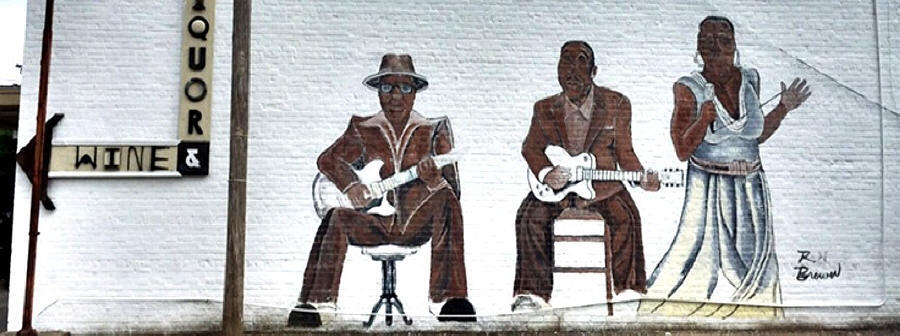
~ Delta Poetry Review ~

- Featured Writer -
Originally from New Orleans, Sheryl St. Germain has published six poetry books, three essay collections, and co-edited two anthologies. Her latest collection of essays, Fifty Miles, appeared in January 2020 with Etruscan Press. She lives in Pittsburgh where she is co-founder of the Words Without Walls Program. In addition to numerous awards for her work, including two NEA grants, in 2018 she was the recipient of The Louisiana Writer Award, presented annually by the Louisiana Center for the Book. She recently retired as Director of the MFA Program in Creative Writing at Chatham University. She is currently working on projects that involve fiber art and poetry.
Three Poems from The Small Door of Your Death, Autumn House Press, 2018
and
One Poem from Fifty Miles, Etruscan Press, 2020
A Perfect Game
—after Robert
Hayden
Sundays too, I tell my son, your grandfather drank—
at the bowling alley between strikes and spares and claps on the
back.
I loved to watch him make the approach for his shot:
how serious, how attentive to his posture,
the placement of his hands, his eyes never
wavering from the pins, the ball sent on its sure arc,
hooking into the head pin at just the right angle
for all to fall down. Often, in the early years,
he would bowl a perfect game, twelve strikes
in a row, no matter how much he drank. Somehow
drink and skill merged for a time into the poetry
of a flawless act. Sometimes we would drive with him
to tournaments far away, fear gripping us as he woozed
back home, barely avoiding the crashes he would have
in the future. Time passed, he bowled fewer strikes,
and his trophies migrated to the hall closet,
piled up one on the other, so many forgotten
bodies: bronze statues of the same faceless man
with the golden ball, his name plated at the bottom.
Before he died he met me for dinner
one last time, hands trembling,
voice quaking, almost incoherent. He couldn’t eat,
would only drink cup after cup of black coffee.
I was still a child. What did I know,
what did I know, of a father’s Stygian alleys,
of drink’s guttered offices?
Rehab
we’re here, our skin thin as parchment
eyes ringed with grief
hearts swollen and scarred
to visit on prescribed days, to come
together with you and your wounded
brothers
it’s hard to hope, but we cling
to any worm of it
after all,
the lights
in the rooms here, are so bright
Reasons to
Live: The Color Red
cowboy boots, scarlet suede
still in the box, smelling like sex
pomegranates, the seeds plumped open
their dark juice seeping into the butcher block
whole cherries in preserves, full
in your mouth, a thick spoonful,
fat raspberries, autumn apples, the memory
of a rich Cabernet or spicy Shiraz,
sun-warm tomatoes from your garden
thick steaks rare and soft,
their blood speaking tongues in your mouth,
your flannel nightshirt, tartan-frayed and forgiving
the dresses from your youth burning
in the closet like coals from a good fire,
salmon when they are dying,
maple leaves when they are dying,
your favorite color before you knew
any better, first color you sang,
the color you love in your mouth,
color that announced your birth into the world.
Hiking in Wyoming, After a Death
--for Gray St. Germain Gideon, 1984-2014
It’s these ancestral mountains, massive as grief,
that dominate, sharp, angular,
fragments
jutting out like fingers or hands.
Split, shattered, cracked,
ruptured,
they bare fracture after fracture
from the ancient wound that made them.
~
It’s summer, the sun fierce
as a new mother, but snow
still hugs the peaks,
defiant as a young child,
wanting,
but refusing,
to let go.
~
You make your way slowly up, around and over
the mountain, sagebrush and pine scenting the air,
mocking memories of other times—
(winter holidays, children who still came home).
~
From the ridge, a rainbow of green in the basin—
sage and silver
green, moss green, gray-green, white-green, blue-green,
grass-bright green, lime and sea green, mint, so many
you think that
green must surely be the color of grief, or god.
You reach down to twist a new shoot from a sagebrush,
its thin leaves a wash of pastel, silver,
water-colored.
You crush the leaves between your fingers,
breathe in deep
as you used to take in
his scent at night,
that last kiss, the sweet smell of boy,
then the tucking in—
you wish green
could be suckled like milk from breasts,
or taken in one’s mouth like air.
The whooshing of the creek, like a crowd applauding or cheering.
From here you can see it
twining around the foot of the mountain—so noisy, so much in a hurry, white water frothing
up. Why is it so angry,
when will it still to pool?
~
A black snake’s frozen
into a flat curl
in the middle of the trail.
You walk around it,
turn
to see a doe and her faun.
They freeze, you freeze,
and in that moment
you catch the doe’s eyes,
large and skittery
You wonder what she would do
to protect her child,
then she bounds away,
the faun following.
~
It’s morning, but the sun acts like it’s noon. The harsh light feels
like poison entering your skin. Your mouth and throat dry with dust.
There’s such a thing as too much light, of seeing too much, you
think. You walk for an hour without shade, consider that you could
die if you made a wrong turn, or your water ran out. The trails
scattered already with the dried bones of trees.
Finally, a lone juniper tree. You stop, sit in its shade, grateful,
take some water from your pack. Maybe you won’t die after all, you
think.
A magpie flies out of the tree in a black and white flash, cawing a
song. The beginning of an old nursery rhyme runs through your head:
One for sorrow,
Two for mirth,
Three for a funeral
. . .
And four for birth
You close your eyes, hope for another.
~
You keep walking in sun, wishing it away until finally it leaves,
the wind comes up, you’re climbing again, and it’s almost cold
enough for a coat. You see vireos, robins, more magpies, are
startled by a sky-blue bird that disappears almost as soon as you
see it.
Another bird’s singing a long song you wish you could understand.
The song’s so complex, it feels like sentences you should be able to
make sense of, but you can’t.
A tiny brown bird flies right up to your face
and stops, beating its wings with what almost seems like glee for a
second, as if it wants to say something, then changes its mind and
disappears.
Maybe joy is like that, you think, unexpected, mysterious, fleeting
~
Ticks hide in high grass
waiting for breath or body,
a shadow.
You’ll find one on your skin later,
its head almost too deep inside you.
You’ll pull her out, but you won’t mind
that something from this place,
so generous with itself,
wanted something from you.
~
A jackrabbit crosses the trail,
stops, looks at you
before bounding away,
pink-skinned ears flaring.
~
The trail winds down until you’re at a small stream buzzing with color. Gossamer-wing butterflies, pale blue, and white-yellow, flit over and around the water.
The pale blue ones—they’re called Blue Melissa—are marked with dark dots on the underside of their wings, an orange row of spots along the edges. Their larvae feed on wild lupine, which must be where the wings get their color. Breathtaking treasures that will only live a few weeks. You know beauty cannot last, though you might wish it could. Better, you tell yourself for the hundredth time, to feel blessed to have encountered it at all. The subject of the poem, Galway writes, is the thing which dies.
~
You keep walking. It’s all you know to do.
~
Breaking the skyline of a ridge,
the headless scarecrow of a cedar tree,
its craggy trunk hollowed out by age or some misery
only the eldest of us know.
Its limbs stretch
out, cross-like, emptied of leaves, as if
to bless or scare.
A marker, a reminder, as if you needed one,
that everything you see and touch and love will die.
Other cedars, stunted but still living, crouch nearby.
Knobby and twisted, their trunks whipped by wind,
roots embracing rock,
they’ve found a way to last longer.
~
You’re trying not to see death everywhere.
You look to the sky, unbroken cornflower blue,
big as your love for him, which death does not diminish.
Concentrate on love, you tell yourself.
Nothing’s hidden here, you say to no one at all,
the sky makes all achingly bare.
~
At the end of the trail
a rabbit sits in an opening
in the rock, behemoth boulders
stacked above the opening.
You wonder if she can sense
how dangerous this hiding place is,
how heavy the boulders,
how, like regret and sorrow,
they could crush at any moment.
~
You turn back, and this time you look for flowers. They’re everywhere: lupine and larkspur, wild iris, yarrow and primrose, phlox, wild geranium. Snow buttercup, beardtongue. Paintbrush, trailing daisy, dwarf sunflower. Wild chamomile.
Some, tiny and vibrant, have rooted in crevices
of rocks. Like the butterflies, they’ll not last long, but oh how
they brighten with their small, mortal lights.
hat to do with such a quarrelsome heart as yours, a heart that does
not agree with Death, amid this stunning, indifferent landscape?
Give it away, something, maybe the wind, says—
Give it to the wild and brave flowers,
just passing through, like him.
Give it to the mountains, the scruffy trees,
the recalcitrant snow, the greedy ticks,
the birds and their ambiguous messages,
the sage, the glorious greens, the creek.
Give it to sun, savage as he was,
give it to the sky, uncluttered and sweeping,
give it to the mountains rising against it,
like you, broken, resilient.
| Archive | Submissions | About |